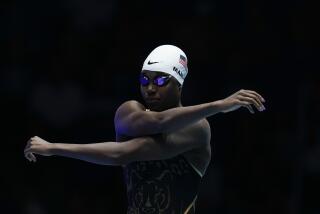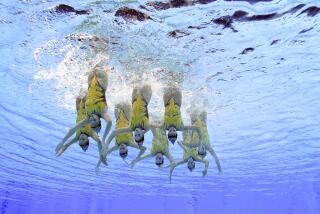Pooling Assets : Swim Meet Hosts Kick In for Foundering E. German Team
- Share via
MISSION VIEJO — In real time it seems like just yesterday. But in Realpolitik time it was a different age altogether.
Gone are the days when the East German sports machine was oiled by a seemingly endless supply of money. Gone is the time when East German athletes’ every need was attended to by a state-financed sports system nurturing selected specimens from cradle to gold medal.
Now the East Germans are benefiting from the generosity of Americans.
Winfried Leopold, coach of a visiting East German swim team, flashes a grateful smile as his swimmers share donated pizza with their American opponents at a Mission Viejo pool before retiring to the homes of their American hosts who are putting them up at no cost.
“The funds have been cut drastically,” Leopold said of the East German government’s support for athletic development. “And it’s really a challenge to keep up the high standards.”
Eighteen members of Leopold’s team are being housed during their stay by the families of the Nadadores, the local swim club against whom they will compete for four days beginning today in the Swim Meet of Champions at the Marguerite Recreation Center.
The crumbling of the Berlin Wall and the political upheaval in East Germany sent shock waves that have dramatically changed East Germany’s sports system. Critics who suddenly found themselves with clout said everyone in East Germany could live more comfortably if the government did not spend so much on sports. Some have estimated that as high as 1% of the gross national product had been diverted for athletics.
“It’s been a real big help that the Americans helped them come over here and train with their team,” Leopold said through an interpreter.
Leopold believes that once reunification of East and West Germany is complete, financial support for swimmers and other athletic programs may be reinstated.
“Once the two countries unite, perhaps the government will have money again to give to sport,” Leopold said. Until then, East German sports groups must begin to seek sponsorships from business and industry, he said.
Some East German sporting officials have agreed to sell to competing nations their unique, advanced technology and training techniques as a means of raising funds, particularly in sports such as luge and kayaking, bicycles and bobsledding, where the East Germans hold a decided technological edge.
However, there are no secrets or technological advantages in swimming for the East Germans to sell, say Leopold and Ray Essick, executive director of U.S. Swimming Inc., this country’s governing body for the sport.
“I’m of the opinion that our technology far surpasses their technology,” Essick said.
Leopold said the success in international competition enjoyed by East German swimmers came not from secret training techniques or classified high-tech equipment. Their gold medals were a direct result of athletes being “taken care of” by the state, he said.
“They had no problems with school or professions,” Leopold said. “They were really taken care of.”
Moreover, the lure of exciting world travel served as an extra incentive for the athletes to excel, Leopold said.
But on this trip the East German team’s travel expenses were aided in part by funds from U.S. Swimming Inc., according to Nadadores’ head coach Terry Stoddard.
“We couldn’t afford to pay and neither could they (the East Germans) to stay in American hotels,” Stoddard said. So it was Mission Viejo to the rescue.
“The doors have just swung wide open,” he said. In the Mission Viejo area, hotels have donated rooms for the East German coaching staff and restaurants have contributed meals, ranging from pizza and hamburgers to spare ribs.
“All these places have been pouring out the welcome mat,” Stoddard said.
More to Read
Go beyond the scoreboard
Get the latest on L.A.'s teams in the daily Sports Report newsletter.
You may occasionally receive promotional content from the Los Angeles Times.






